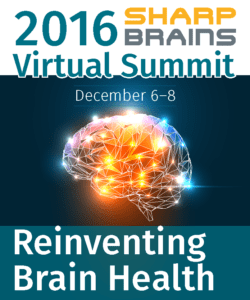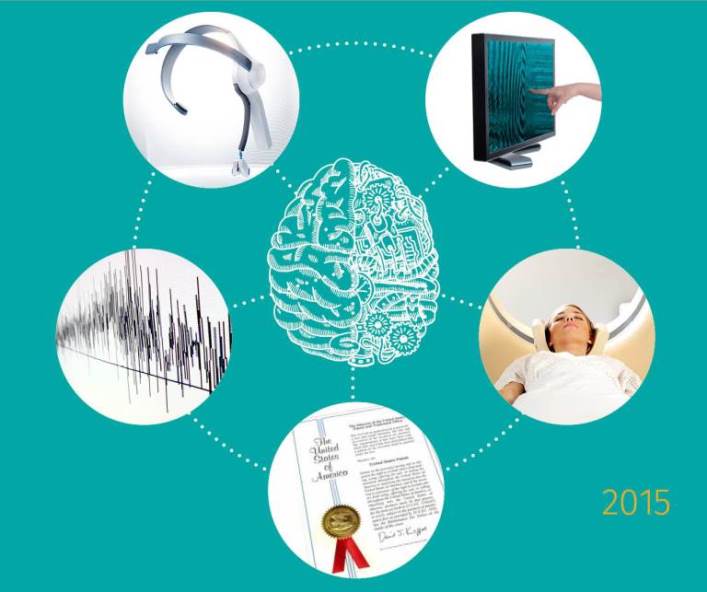Retooling brain health care with pervasive, inexpensive, data-driven digital technologies
While sophisticated neuroimaging techniques such as fMRI (functional magnetic resonance imaging) provide a significant boost in our understanding of the brain — and research studies constantly reported all over the media — they are very costly. This makes it difficult to reach the mass scale required to conduct meaningful research and to improve the brain health care of millions if not billions of people around the globe.
Good news is, we are witnessing an explosion of new methods that make use of low cost, ubiquitous technologies to inform brain health prevention, diagnoses and treatments on a wide scale.
Max Little’s five-minute TEDTalk A Test For Parkinson’s With A Phone Call provides a great example. Assuming the 10,000-subject experiment run by the Parkinson’s Voice Initiative is successful, we will soon have a new disease measure that is both accurate and accessible. The brain may be an amazingly complex organ, but with the right tools and some ingenuity, we can build on that complexity to find new ways to improve brain health across the full lifespan.
Parkinson’s, as Little points out, afflicts over 6 million individual worldwide, but it’s just one of a number of neurological conditions that together take a terrible collective toll. Think about ADHD, concussions, depression, Alzheimer’s Disease, and more. Improving prevention and care for all these conditions faces one common obstacle: the lack of scalable assessments that can help objectively assess and monitor the continuum between health and disease. Without them, we need to rely exclusively on very expensive medical equipment and clinical evaluations, which means too few people, and too late, access them.
So what are some alternatives? Little’s experiment is based on the phone. Others are researching blood tests. A surge of innovation is already taking place in Internet-enabled digital platforms designed to monitor and enhance cognitive and emotional functioning. For example, in this market report we predicted that, in just a few years…
- More than one million adults in North America alone will take a self-administered annual brain health check-up via their iPad or Android tablet.
- iPad-based cognitive screenings will inform more diagnoses of Alzheimer’s disease and MCI than neuroimaging.
- More than one million amateur athletes will better manage possible concussions by taking cognitive baseline tests via a mobile device.
- Biometrics-aided meditation will become the next big thing in corporate and consumer wellness.
- More than 150,000 teenage and adult AAA members will access web-based brain training to become safer drivers.
These tools are especially powerful when used, as we also saw in Little’s talk, in combination with large datasets that provide researchers and developers with an unprecedented amount of information used to hone their diagnostic and predictive abilities. Over the course of this decade, we will likely see Big Data applications that will enable truly personalized brain health solutions, based on an individual’s brain characteristics and progression over time. If we are to meet a massive and growing need, we’ll need to disrupt today’s status quo in which research is based on small and fragmented clinical trials, and where active brain care is often left for patients whose problems have grown until it is too difficult to manage them.
Now, technologies bring no value without actual users.
What is truly exciting is the confluence of factors making brain health and fitness a priority for the general population. Eighty three percent of respondents to a SharpBrains survey of 3,000+ decision-makers and early adopters said that “adults of all ages should take care of their ‘brain fitness,’ without waiting for their doctors to tell them to” and also that they “would personally take a brief assessment every year as an ‘annual mental check-up.” At the same time as the idea of brain fitness starts to go mainstream (contrast where physical fitness was fifty years ago with where it is now), equipment that used to be expensive and cumbersome is becoming user-friendly and inexpensive.
 While brain health innovation still has a ways to go before reaching the level of development as physical fitness and cardiovascular health, it is hundreds of pioneers like Max Little who are pushing things forward at an ever quickening pace and often under the radar. What seems unconventional today may well look conventional by as near as 2020.
While brain health innovation still has a ways to go before reaching the level of development as physical fitness and cardiovascular health, it is hundreds of pioneers like Max Little who are pushing things forward at an ever quickening pace and often under the radar. What seems unconventional today may well look conventional by as near as 2020.
–> Learn more & Register to participate at the 2016 SharpBrains Virtual Summit: Reinventing Brain Health (December 6–8th, 2016)



